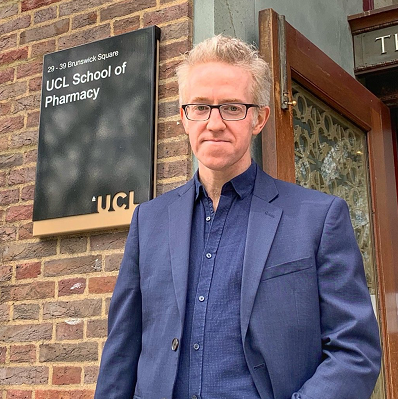Meet the Expert: Matthew Todd
23 November 2020
Matthew Todd is Chair of Drug Discovery in UCL’s School of Pharmacy. His research focuses on the development of new ways to make molecules - particularly in open science projects where all the research takes place “live and online” in the public domain.
Matthew has pioneered how this open source approach can help discover new, inexpensive medicines. He has founded several consortia seeking new treatments for malaria, TB, fungal and bacterial infections.

Besides the research in chemistry and biology he’s also interested in how a public domain medicine might be taken through clinical trials to market, without a patent. As one approach he recently founded a company, M4ID Pharma, which hopes to do this for the first time. Matthew’s research lab is in the School of Pharmacy, on the ground floor overlooking Hunter Street. He has a lab motto which is "To make the right molecule in the right place at the right time", and his students are trying to figure out what this means!
We caught up with Matthew to ask him our ‘Quick Fire 5’ questions and this is what he told us…
What inspired you to specialise in the area of the discovery of medicines?
Matthew: Ever since I was a youngster I’ve been fascinated by the molecular – the way we put atoms together, the way the electrons swirl and shimmer around them, the infinite variety of shapes and functions from the origins of life to death by strychnine, and the total implausibility that we can give something as complex as an animal a single drug and see one, defined, useful effect. That all this beautiful science can actually help people makes it irresistible.
Explain what you mean by ‘making the right molecule in the right place at the right time’ – and why it matters?
Matthew: That would be telling.
Why do you believe Open Science is so important – and do you think it has particular significance during the COVID-19 crisis?
Matthew: What do we do when we can’t solve a problem? We ask people for advice or help. What’s the best way of getting things done? Hang around smart, optimistic people. The internet has created the possibility of collaborating with the world, and we’ve seen evidence of what is possible when effort is well-coordinated through the construction of high quality, lasting resources like Wikipedia and all of the software that underpins the internet.
While academia is all about collaboration, much of the work is unnecessarily carried out in silos, meaning there are delays to important advances, fewer chances of key insights from others and real dangers of unnecessary duplication. Everyone knows this, which is why the calls for data sharing have been so clear and frequent during the COVID crisis. But every disease is a crisis for someone, so let’s keep on sharing after the virus has gone. Maybe that will help us be better prepared for the next pandemic. A major interest of mine is to show how a completely public domain molecule can be taken through to benefit patients in the absence of secrecy.
How are you adapting your teaching approach as you nagivate the new restrictions in place due to the pandemic?
Matthew: Some aspects of traditional face to face teaching are questionably useful. Many lectures are given as performances and many can easily move online. This frees us to interact with students better in new ways. There’s nothing quite as effective as face to face teaching where there is a dialogue between student and teacher. That’s certainly the most fun activity I engage in as an educator. So we need a change and I’m very optimistic that this current crisis is accelerating us towards creating change that we all knew was for the best, but perhaps we’d been putting off. We’ve invested a great deal of time and thought into how we can better train students in so-called computational chemistry, specifically how we can use computers to predict molecules that will bind to proteins. Lockdown has given us the perfect excuse to invest in this area, which is so valuable for training students in the newest techniques. Across the board, I’ve been impressed with how my colleagues have invented and adapted so quickly.
I like to have meetings in varied places – the lab, the coffee shop, walking the street. My office has no chairs. This is partly to ensure meetings don’t carry on too long, but partly to put people, particularly students, at ease. It’s a little more relaxing if you’re able to move around a space rather than being confined to a chair. Carrying out Zoom meetings with students is easy online but it’s gone back to a slightly formal, rigid environment and I miss the flexibility and sparkle of in-person tuition.
What motivates you at the start of each day?
Matthew: That at the end of the day I might have sorted things out.
Further Information:
- Mat’s Group
- Open Source Malaria (OSM)
- Open Source Antibiotics
- Open Source Pharma
- Mat’s Six Laws of Open Source Drug Discovery
- M4ID Pharma
 Close
Close

